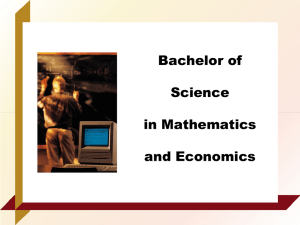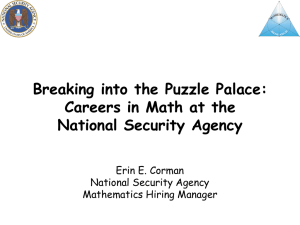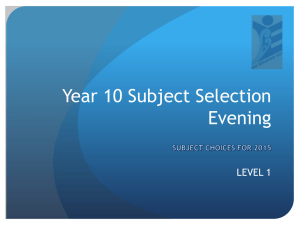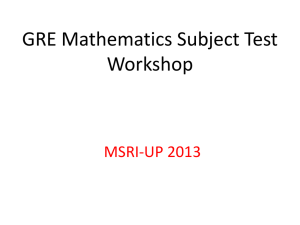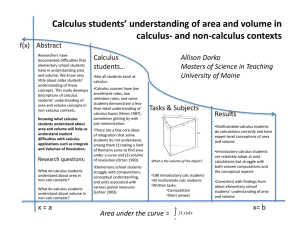Day1 - Department of Mathematics
advertisement
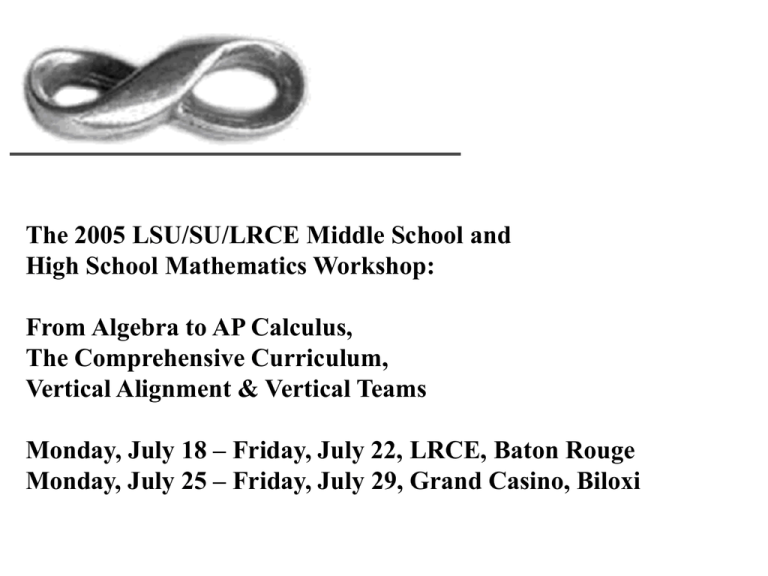
The 2005 LSU/SU/LRCE Middle School and High School Mathematics Workshop: From Algebra to AP Calculus, The Comprehensive Curriculum, Vertical Alignment & Vertical Teams Monday, July 18 – Friday, July 22, LRCE, Baton Rouge Monday, July 25 – Friday, July 29, Grand Casino, Biloxi 8:00-9:30 Greeting & Introductions, Project Rationale and Goals, Technicalities 9:30-9:45 Break 9:45-12:15 Vivian Stephens, College Board: Mathematics Vertical Teams 12:15-1:00 Lunch (sandwiches and soft drinks will be provided) 1:00-3:00 Vivian Stephens, College Board: Mathematics Vertical Teams Kevin Blount, Mathematics Chairperson, Holden High School (Vertical Alignment & Teams) Mandy Boudwin, Lutcher High School (Comprehensive Curriculum Writer) Jim Carroll, Math Chairperson, Baker High School Scott Champagne, Department of Mathematics, LSU George Cochran, Associate Chair of Instruction, Department of Mathematics, LSU Raphael Curtis, The College Board, Southern Regional Office (Vertical Alignment & Teams) Fan Disher, Mandeville High School (Comprehensive Curriculum Writer) Zoe S. Harrell, University Laboratory School, LSU (Comprehensive Curriculum Writer) Patricio Jara, Department of Mathematics, LSU Teri Lawrence, Louisiana Resource Center for Educators (Technology & Everything Else) Donna Lee, Istrouma High School Kim Melancon, St. Amant High School (Comprehensive Curriculum Writer) Joseph Meyinsse, Department of Mathematics Chair, Southern University Frank Neubrander, Department of Mathematics, LSU Millie Powell, Walker High School Rebecca Runnels, Runnels School (Comprehensive Curriculum Writer) Bobby Stecher, Department of Mathematics, LSU Vivian Stephens, The College Board (Vertical Alignment & Teams) Kevin Tubbs, Department of Mechanical Engineering, LSU National Science Foundation GK-12 Fellows Program at LSU Louisiana Education Quality Support Fund (Traditional and Undergraduate Enhancement). Overcoming Louisiana’s Math Gap: From Algebra to Calculus. Louisiana Education Quality Support Fund (Education Enhancement). Enhancement of Mathematics Preparedness for Postsecondary Education. Louisiana Education Quality Support Fund (Education Enhancement). Enhancement of Advanced Placement Opportunities. High Schools: Istrouma, Walker, Baker, Glen Oaks, East Iberville, Belaire, Broadmoor, Tara, Denham Springs, Sillivan, St. James Middle Schools: Capitol, Kenilworth Tentative List of Participants: Armstrong, Terry (Istrouma) Bain, Timothy (Tara) Bergeron, Karen (Baker) Carroll, Jim (Baker) Champagne, Scott (St. James) Conachen, Joe (Baker) Earle, Trey (Glen Oaks) Faradj, Mabrouck (St. James) Flake, Amy (Denham Springs) Fleet, Leslie (Kenilworth) Lee, Donna (Istrouma) Perkins, Thomas (Silliman Institute) Powell, Mildred (Walker) Randolph, Charlene (Broadmoor) Raush, Linda (Broadmoor) Ruffin, Karin (Kenilworth) Sept, Hazel (Capitol) Simms, John (Belaire) Stansbury, Emme (Denham Springs) Stewart, Symentress (Capitol) Tyler, Kate (St. James) Wiggins, Tarra (Istrouma) Williams, Jamie (Walker) Woods, David (Tara) •For the older generation it was okay coming to college without prior exposure to calculus. But these days are long gone. •Today, calculus is the gateway course to all college programs in scientific, technological, engineering, and mathematical disciplines. •Calculus is the gateway to statistics and probability theory and, therefore, is a requirement for all business oriented programs. •Calculus is a cornerstone of the modern scientific and technological language – not being able to speak the language of calculus is a barrier to success in college and reduces significantly a person’s economic viability. •Exposure to Calculus leads to significantly higher ACT scores. In our experience, students have a difficult time dealing with the algebraic aspects of calculus. The difficulties are often so overwhelming, that teaching calculus past chapter two becomes impossible. Our feeling is that so much time has to be spent on preparing the bulk of students for standardized tests, that the emphasis put on more challenging algebraic procedures has often become a forgotten part of the high school curriculum. In the present politically dictated fixation on lowering failure rates, the brightest of our students are often those who are left behind forever. Without sufficient practice and exposure to a more challenging algebra curriculum, our college bound students have very little chance of being successful in the ever growing number of undergraduate programs and careers that demand such skills. In 2003, out of 137,499 Louisiana 11th and 12th graders, only 4,179 took at least one AP exam. With 51 AP exams per 1000 11th and 12th graders, Louisiana is last in the nation (national average is 225 per 1000). In 2003, of the 325 public high schools only 72 offered any AP classes, or 22%. The national average is 66%. In 2003, 175,094 students took the AP Calculus AB test in the US. In LA, 740. In LA’s public schools, 337. LA’s science, technology, and engineering departments suffer from low enrollment. In 2003, only 430 out of 161,000 undergraduates in Louisiana were math majors. Nationally, 1.2% of undergraduates are majoring in math compared to less than 0.3% in LA. 6 Figure 2.5: Average ACT Mathematics Test Score Increase by High School Mathematics Course Sequence for All Louisiana Students Course Sequence % Taking Average ACT Mathematics Score Algebra I, II, Geom, Trig, Calculus 4% 23.5 Average Score Increase Algebra I, II, Geom, Trig, Other Advanced Math 4% 6.6 21.1 Average Score Increase Other Combinations, 4 or More Years 26% 4.2 21.8 Average Score Increase Algebra I, II, Geom, Other Advanced Math 16% 4.9 19.1 Average Score Increase Algebra I, II, Geom 23% Average ACT Mathematics Score Increase from Alg I, II, Geom 2.2 16.9 Louisiana students taking at least one course beyond Algebra I, II, and Geometry on average score significantly higher on the ACT Mathematics Test than students taking Algebra I, II, Geometry and no more. 22 ACT composite score of 20 or greater OR High school GPA of 2.0 or greater OR High school graduation rank top 50% of class AND Require no more than one remedial course: LSU-Shreveport, McNeese, Nicholls, Northwestern, Southeastern, ULMonroe, Southern (S2006), LSU-Alexandria (F2007), Grambling (F2010), Southern -N.O. (F2010) ACT composite score of 23 or greater OR High school GPA of 2.5 or greater OR High school graduation rank top 25% of class AND Require no more than one remedial course Louisiana Tech, UL-Lafayette, UNO ACT composite score of 25 or greater OR High school GPA of 3.0* or greater OR High school graduation rank top 10% of class AND Require no remedial coursework LSU Baton Rouge 100 90 80 70 62 60 50 46 40 30 33 23 20 20 20 14 7 10 3 0 ACT Composite = 20 or ACT Composite = 23 or ACT Composite = 25 or Higher Higher Higher All African Am erican Caucasian Percentage of 2004 Louisiana ACT-Tested Public School Graduates Meeting Louisiana’s Admission Standards for Fall 2005, Using ACT Composite Scores Since 1980, the number of S&T&E positions has risen at more than four times the rate of growth for all jobs. For the period from 2000–10, employment in S&T&E occupations will increase about three times faster than the overall growth rate for all occupations. Although every S&T&E occupational group grew between 1980 and 2000 (the lowest growth, 81 percent, occurred in physical sciences), the most explosive growth was in math and computer sciences, which experienced a 623 percent increase (177,000 jobs in 1980 compared with 1.28 million jobs in 2000) Four new AP Calculus programs Five of the 22 students participating in an AP Calculus class at Baker High (4), Walker High (13), and Plaquemine High (5) passed the test with a score of 3. Another four scored a 2. Two students became math majors at LSU. The students at Istrouma High did not take the test. However, like at all other schools, the ACT scores improved dramatically. 2005-06: Add another seven AP Calculus programs 2006-11: Louisiana AP Calculus Consortium Students Say High Schools Let Them Down By MICHAEL JANOFSKY, The New York Times · DES MOINES, Iowa (July 15) - A large majority of high school students say their class work is not very difficult, and almost twothirds say they would work harder if courses were more demanding or interesting, according to an online nationwide survey of teenagers conducted by the National Governors Association. The survey also found that fewer than two-thirds believe that their school had done a good job challenging them academically or preparing them for college. About the same number of students said their senior year would be more meaningful if they could take courses related to the jobs they wanted or if some of their courses could be counted toward college credit …….. School mathematics is a chain of courses that is as strong as its weakest link. To strengthen this chain, we are here to promote vertical teaming in math in your schools. By searching for connections between the math that we teach and AP-level calculus, we ensure continuity in the math curriculum. We want you to discuss the links between Middle School Math, Algebra I & II, Geometry, Advanced Math & and Trig., and AP Calculus: vertical alignment of the math curriculum. We want you to go through the State’s new comprehensive curriculum and discuss strategies on how to implement it. To help you to better address the needs of the high achieving students at your schools, we will discuss realistic strategies to develop, implement, and support a vertically integrated mathematics program at middle and high schools that leads to a strong AP Calculus class in the senior year: LEAPdata query system. Finally, we want you to become familiar with a variety of support systems designed to assist teachers and schools that want to introduce or strengthen their AP Calculus programs. Paperwork & Break Please fill out the Teacher Information Sheet and make sure that you signed in. Thank you! 9:45-3:00 Vivian Stephens, College Board: Mathematics Vertical Teams 12:15-1:00 Lunch (Sandwiches and Soft-Drinks will be provided)
